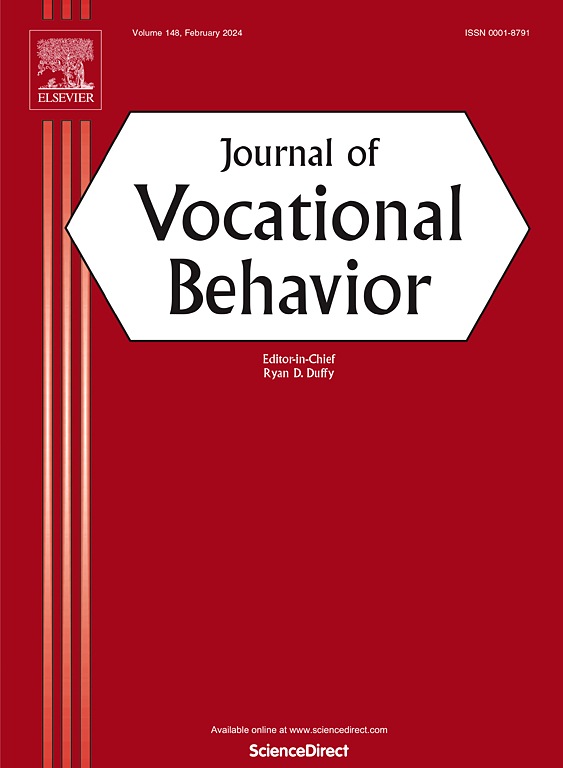Living a value-based work life: Individual values as predictors of career outcomes
IF 5.2
1区 心理学
Q1 PSYCHOLOGY, APPLIED
引用次数: 0
Abstract
We use Schwartz's theory of universal human values as an integrative framework for testing relationships between values and career outcomes. Utilizing a longitudinal, within-subjects study design, we collect values data from a sample of undergraduate students prior to graduation and re-survey the same individuals approximately 10 years later to collect data on career development. We analyze the data using hierarchical linear regression, controlling for known covariates such as cognitive ability, academic performance, personality, and gender at Time 1 as well as marital status and number of children at Time 2. Five of eight hypotheses are supported. Achievement values positively predict compensation and job level; benevolence values positively predict work engagement; security values are negatively related to number of international relocations; and stimulation values positively predict job level. We discuss the implications of these findings for values theory and the literature on career development.
以价值为基础的工作生活:个人价值观作为职业结果的预测因素
我们使用施瓦茨的人类普遍价值观理论作为一个综合框架来测试价值观与职业成果之间的关系。利用纵向的、主题内的研究设计,我们从毕业前的本科生样本中收集价值数据,并在大约10 年后对同一个人进行重新调查,以收集职业发展的数据。我们使用层次线性回归分析数据,控制了已知的协变量,如认知能力,学习成绩,个性,时间1的性别以及时间2的婚姻状况和子女数量。8个假设中有5个得到了支持。成就价值观正向预测薪酬和工作水平;仁爱价值观正向预测工作投入;安全价值与国际迁移的次数呈负相关;激励值正向预测工作水平。我们讨论了这些发现对价值观理论和职业发展文献的启示。
本文章由计算机程序翻译,如有差异,请以英文原文为准。
求助全文
约1分钟内获得全文
求助全文
来源期刊

Journal of Vocational Behavior
PSYCHOLOGY, APPLIED-
CiteScore
13.10
自引率
5.40%
发文量
85
期刊介绍:
The Journal of Vocational Behavior publishes original empirical and theoretical articles offering unique insights into the realms of career choice, career development, and work adjustment across the lifespan. These contributions are not only valuable for academic exploration but also find applications in counseling and career development programs across diverse sectors such as colleges, universities, business, industry, government, and the military.
The primary focus of the journal centers on individual decision-making regarding work and careers, prioritizing investigations into personal career choices rather than organizational or employer-level variables. Example topics encompass a broad range, from initial career choices (e.g., choice of major, initial work or organization selection, organizational attraction) to the development of a career, work transitions, work-family management, and attitudes within the workplace (such as work commitment, multiple role management, and turnover).
 求助内容:
求助内容: 应助结果提醒方式:
应助结果提醒方式:


